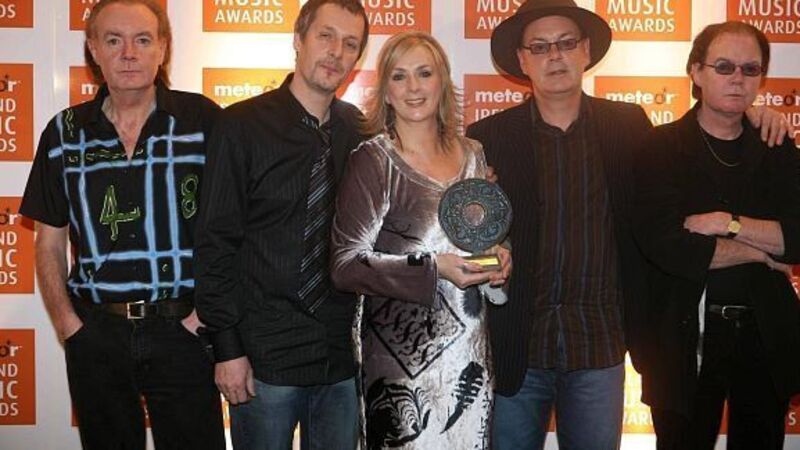Clannad go back to their roots

EVERYONE agreed it was crazy for Clannad to think they could have a music career by singing in Irish. “We were just starting out and some quite respected folk figures told us Irish would be dead in five years,” says Moya Brennan, front-woman of the ethereal folkies. “A lot of people were laughing at us.”
This was the late 1970s. With the economy flagging and the Northern Troubles at their height, national self-esteem was in a sorry place. People wanted to forget they were Irish. But Clannad, from the Gweedore Gaeltacht, along Donegal’s Atlantic coast, were a long way from the chattering classes and never got the memo.
“Irish wasn’t the done thing. For Clannad, however, it was the natural way to express ourselves. We grew up speaking the language. It was stranger for us to write songs in English than in Irish. English didn’t come as easily. So we did what felt natural,” Brennan says.
Clannad, consisting of Brennan, two younger brothers and their twin uncles, needed audiences that esteemed the national language. So they went to Germany, a country peopled with Hibernophiles, who would listen without prejudice to Clannad’s repertoire of sean-nós and disembodied dirges.
“They loved it, absolutely adored it,” says Brennan, 62. “They responded to the mystical etherealness of it. I suppose, we were ahead of our time: ethereal wasn’t really a thing in music. We were sort of the first.”
Back home, Clannad began to win fans. They were regarded as a novelty — the native Irish speakers who refused to sing in English.
“We would perform in schools. Because it was Irish, we sold it to them on the basis it was educational. We went all over. I remember it well: we’d arrive in, say, a convent in Tuam. The nun would come out and say ‘I’m sorry, there are only 30 people coming, they don’t know what it is’. We’d get out of the van and the lads would be hauling the equipment and they all had long hair. People had never seen anything like it — they’d expected a céilí, or something like that. All of a sudden, the venue would be packed.”
Clannad recently reformed after more than a decade. By the early 1990s, they were burned out and wanted to try new things. However, they reconvened for a date at Temple Bar Trad Fest in 2011, and were astonished at the response, one gig becoming a three-night residency to cater for demand. A new album followed; now, they are embarking on their first Irish tour since 1993.
“We were tired and wanted to rest it for a while. Of course, you never really break-up. How can a family break up? I’m the oldest of nine. You see everyone else all the time: at family events, and what have you,” she says.
Recording the Nádúr LP, they were surprised at how easily it all clicked. They were older, had families and obligations. And yet, nothing had changed. The studio door shut and they went back to being five, starry-eyed youngsters from deepest Gweedore.
“It was amazing — the songs came together very quickly. The harmonics, the writing… all of it just worked. In the end, we had too much material. We had to leave things out. It was very productive — we were really enjoying it. I will always remember the Christ Church gigs, in particular. People came from all over the country — from Donegal, from Galway, from Cork — to see us.”
Clannad, who briefly counted Moya’s younger sister, Enya, as a member, broke through with a commission to write music for Troubles’ drama, Harry’s Game. The series, screened by ITV in 1982, is now long-forgotten, but their ‘Theme From Harry’s Game’ endures. Haunting and darkly dreamy, it was a major international hit — and the first Irish-language tune performed on Top of the Pops.
“An Irish song on Top of the Pops. You didn’t have that,” Brennan says. “Someone said to me: ‘How does it feel to be a pop star’? I was like ‘pop star?’ It sounded weird.”
Whatever about pop, Clannad were soon stars. They were hired to compose the music for a revisionist reboot of Robin Hood, which drew on the character’s pre-Christian origins. Channeling ancient Irish and pagan sensibilities, their theme song, ‘Robin (The Hooded Man)’, was the making of the show.
From that moment on, the Donegal family were a byword for a very specific sound — a highly esoteric folk music suffused with the drizzle, the beauty, the mournfulness of rural Ireland.
A glittering career ensued:Brennan dueted with Bono, Hollywood sought the band’s services; they sold 15m albums.“I would never live in Los Angles — oh no,” says Brennan, laughing, but sounding faintly traumatised. “We did Last of the Mohicans and Patriot Games. I was involved in King Arthur, with Hans Zimmer. Hollywood was overwhelming: they have their own very clear idea as to what they want and do not want. I found they were obsessed with how I sang: they were endlessly curious about the sort of mic I use, the compression techniques we employed.
“They thought my voice was very studio-based. I told them it was simply how I sang: I’m from Donegal, that’s how I grew up singing. That’s the thing about Hollywood —they want to get as much out of you as they can.”











